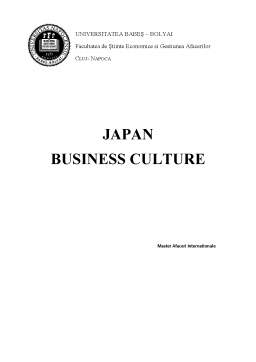Extras din referat
Introduction
Japanese market can be truly called a foreign market. And not just because consumer habits are different from those of the exporting countries, but also because their mentality, the way of living their lives and of looking at things is different. They have a completely different culture, traditions and customs respected by all members of the society, regardless of rank. In addition to administrative obstacles encountered, the foreign businessman meets a completely different style of doing business. They have to change radically their way of promotion, to take "unconventional" distribution channels, to find new ways of solving problems, change agreements, and dealing with employees.
Tradition, Customs and Japanese Business Etiquette
The Japanese are very different culturally, their uniqueness is considered to be caused mainly by three key factors: their history, characterized by isolation, the crowdness imposed by the nature and the Japanese language itself.
Although for many centuries Japan had close cultural relations with China, Tokugawa period, which began in 1603, resulted in almost total isolation from the rest of the world. During that time, the country, isolated from foreign influences, has created a society and a different culture in terms of group cooperation. The most important organizational features developed in that period, are characteristic of Japanese society today, despite the changes that have occurred in the twentieth century. Achieving a massive displacement of population in big cities, it was created a phenomenon known as "Network-based society". This type of society implies a strong interdependence between all group members and an abundance of moral and social relations, both vertical and horizontal. It all starts right from the birth. While Westerners babies are soon separated from their mothers and have their own room, Japanese children are kept close to parents day and night, until the age of two or three years. Western children take the initiative and acquire experience in solving problems. Japanese children, in contrast, are encouraged to be totally dependent on those around them and develop a sense of interdependence that accompanies them throughout their lives. They can ask favors of their group and they will be granted. Their first "group" is family, then the high school, next comes the college and finally the business enviroment. This society structure is advantageous for Japanese businessmen in terms of "inter-networking". Even though the Japanese show a lot of respect to privacy, they are very sociable when discussing business and such organization provides an important source of information.
Japanese behavior is strongly influenced by the nature of language. Japanese is often described as a vague or ambiguous language. For example, verbs are impersonal, so often you do not know who is related to action. This ambiguity is often used intentionally by speakers of Japanese who want to absolve someone and look polite. In Japan, everything must be placed in a context, therefore a direct expression is too short. No Japanese leader will say: "Please order the office"!. They have to use subordinates, for example: "Because we will be visit by some important guests, and because we want to leave the best impression of our company, maybe it would be well to do a little bit of order around here. Noteworthy is the fact that Japanese have no mechanism for indirect speech.
Japanese culture has evolved in past few years, from the country's original culture, Jomon, to the contemporary culture , a mix of influences from Asia, Europe and North America.
Japanese Civilization exhibit a particular interest and a great emotional involvement for the arts. For a person who goes to Japan with the intent to do business there, it is essential to know at least a part of them. Japanese traditional arts includes: ikebana (floral art), origami, handicraft (dolls), poetry, performances (dance, Kabuki- theater that combines comedy with drama, dance, music, noh-the oldest form of musical theater of Japan, traditions (games, Onsen, sento, tea ceremony, budo, architecture, gardening,) and culinary arts.
Preview document
Conținut arhivă zip
- Japan - Business Culture.docx















